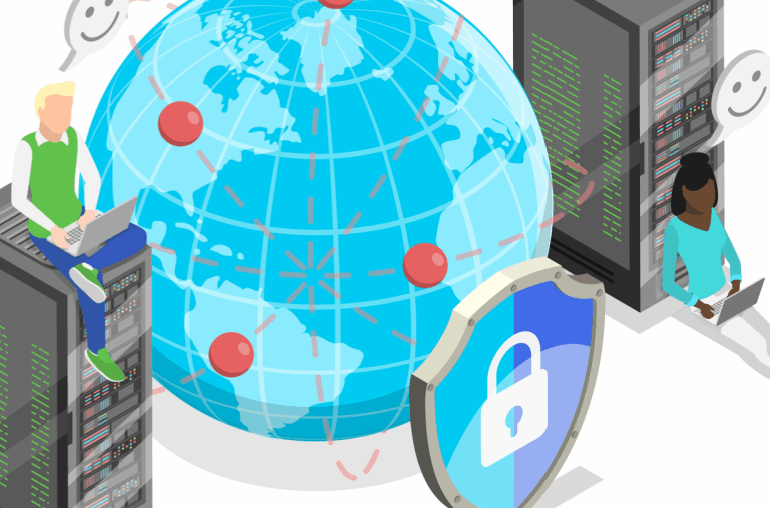A DNS server, or Domain Name System server, acts like an Internet lookup server that helps you connect to websites quickly and easily. When you type a web address into your browser, a DNS server translates that name into a machine-readable IP address. This process is essential to how the Internet functions, and it happens in milliseconds.
In this guide, we’ll break down a user-friendly DNS meaning, and how it applies to your online experience. We’ll also explain how DNS works, why it matters for your digital privacy, and how using a VPN like PrivadoVPN that offers SmartDNS technology can enhance your security by protecting DNS requests on any device.
DNS Server Explained: What Is It?
At its core, a DNS server functions like a virtual phone book for the Internet. When you enter a website address (like privadovpn.com), your device needs to find the actual IP address where that site is hosted. DNS servers handle this translation process so you don’t have to memorize a string of numbers to reach these websites.
DNS Meaning
- Domain Name System (DNS): A hierarchical system that translates user-friendly domain names into IP addresses.
- DNS Server: A server that stores and manages DNS records and handles requests to resolve domain names into IP addresses.
Without DNS, you’d need to remember long IP addresses for every site you visit. DNS makes the Internet usable by translating these into recognizable names.
How DNS Works: Step-by-Step
Understanding how DNS works gives you insight into how devices find and connect to websites behind the scenes. Here’s a simple breakdown, going step-by-step into the process of DNS activity:
Step 1: You Enter a Web Address
You type a URL (like www.privadovpn.com) into your browser. Your device doesn’t understand domain names; however, it needs an IP address.
Step 2: Your Device Checks Its Cache
Before reaching out to a DNS server, your device checks its internal cache to see if it has recently resolved that domain and can access it quickly. If it finds it, the process stops here.
Step 3: The DNS Query Begins
If the domain isn’t cached, however, your device sends a query to a DNS resolver (usually provided by your Internet Service Provider).
Step 4: The Resolver Contacts Root and TLD Servers
- Root Server: Directs the resolver to the correct Top-Level Domain (TLD) server (.com, .org, etc.)
- TLD Server: Points the resolver to the authoritative name server for the domain
Step 5: Authoritative Name Server Responds
This server provides the exact IP address for the domain name so you can access the website.
Step 6: Connection Established
Your browser uses the IP address to connect to the page you’re attempting to reach. Meanwhile, your device stores the result in its cache for future requests.
Why DNS Servers Matter for Your Privacy
Most people don’t realize that DNS servers can also impact their privacy and security on the Internet. Every time you make a DNS request, you’re revealing which websites you’re visiting, even if the site itself uses encryption.
Here’s how DNS activity impacts your digital privacy:
- DNS leaks can expose your browsing activity to third parties, including ISPs
- Many default DNS servers log requests, tying them to your IP address
- Public DNS services might prioritize speed over security
How PrivadoVPN Protects DNS Requests
With PrivadoVPN, your DNS requests are completely encrypted and routed through our private, secure servers. This keeps your Internet browsing history shielded from snooping, tracking, and potential manipulation.
Benefits of using PrivadoVPN for DNS protection:
- Encrypted DNS traffic
- No third-party DNS logging
- Built-in DNS leak protection
- Automatic configuration with no setup required
PrivadoVPN also offers users access to our Control Tower SmartDNS features. This comprehensive suite of advanced security features delivers total peace of mind as you browse the web. It offers useful settings like:
- Protection from major threats: This includes malware, ransomware, phishing scams, and even crypto scams
- Parental control settings: Block adult sites and social media apps like TikTok, YouTube, Facebook, and Twitter to protect your children from possible risks to their safety
Interested in exploring everything PrivadoVPN’s Control Tower SmartDNS has to offer? It’s easy to use and you can get started immediately. Click here to sign up.
Set Up Secure DNS with PrivadoVPN (No Technical Skills Required)
Using PrivadoVPN’s powerful VPN automatically configures your device to use our secure DNS servers, so you don’t have to manually change settings or worry about DNS leaks.
To get started:
- Sign up for a PrivadoVPN account.
- Install the VPN app on your preferred device, whether it’s your desktop computer, laptop, tablet, smartphone, or even your home router.
- Connect to any server and your DNS protection is enabled automatically.
- Enjoy safer, private browsing with DNS leak protection built in.
No complex setup, no exposure…just complete Internet privacy. And with our top-rated DNS servers alongside the other features available in our Control Tower, you’re sure to get the secure and dependable online journey that you deserve.
Protect Your Internet Activity with PrivadoVPN
Understanding what a DNS server is and how it works is essential for anyone concerned about online privacy. DNS servers make the Internet usable, but without protection, they can reveal sensitive information about your browsing behavior.
PrivadoVPN encrypts every DNS request to keep your online activity private, fast, and secure. With automatic leak protection, dependable encryption, and global server coverage, we provide the most comprehensive VPN available today.
Ready to take your security up a notch? Sign up for PrivadoVPN now and take control of your Internet privacy; no technical experience required.
—
For more privacy and security insights, explore the rest of the PrivadoVPN Blog and stay ahead of online threats.
Frequently Asked Questions
What does DNS mean?
DNS stands for Domain Name System. It’s the system that converts human-readable domain names (like example.com) into IP addresses that computers use to identify each other on the Internet.
Can I change my DNS server?
Yes, you can manually configure your device to use different DNS servers, such as Google DNS or Cloudflare DNS. However, using a VPN like PrivadoVPN automatically sets you up with secure, private DNS.
Why should I care about DNS privacy?
Every DNS request can reveal where you’re going online. Without encryption or DNS leak protection, third parties like ISPs can see your activity—even on HTTPS sites.
How do I know if my DNS is leaking?
Tools like DNS leak tests can help, but the easiest solution is to use PrivadoVPN, which includes DNS leak protection by default.




